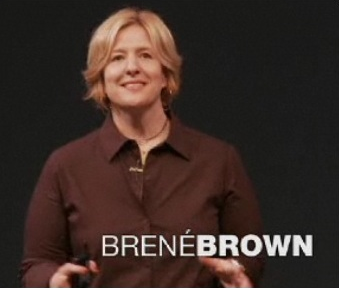 Brené Brown talks about the power of being vulnerable in her 2010 Ted Talk. She originally set out to gather stories about how people react to questions about some of the deepest and most personal topics that give meaning to our lives. In the process she learned that people self-sort into two different groups: those who live life with an inner sense of worthiness, and those who struggle to believe in themselves. What do the “worthy” people have in common? She tells us they are “wholehearted.” They live their lives with the courage to be themselves and be imperfect. They fully embrace their vulnerability.
Brené Brown talks about the power of being vulnerable in her 2010 Ted Talk. She originally set out to gather stories about how people react to questions about some of the deepest and most personal topics that give meaning to our lives. In the process she learned that people self-sort into two different groups: those who live life with an inner sense of worthiness, and those who struggle to believe in themselves. What do the “worthy” people have in common? She tells us they are “wholehearted.” They live their lives with the courage to be themselves and be imperfect. They fully embrace their vulnerability.
What we gain from being vulnerable and wholehearted is the experience of life more fully lived with all of its ups and downs. If we do not numb our negative feelings, and have the courage to experience them, then we also feel the positive feelings more deeply. In other words, the courage to feel sad, angry, hurt, or hopeless at times also gives us a fuller experience of joy, creativity, love, and happiness. Shame is no longer crippling and cannot stop us from living a full life. Our lives become more robust.
What does this have to do with your job search? When you set out on a job quest, as I describe in my book, Job Quest: How to Become the Insider Who Gets Hired, it will help you to succeed if you have the courage to be vulnerable. Whether you are looking for your first job after graduation, or a job to transition to mid-career, or the second life you want to have when you semi-retire, all of these moments are vulnerable times for us. To find the first job or the next job it is vitally important to meet with many people and hear their stories and tell your story. It is vitally important to tell everyone your dream and dilemma so that they will brainstorm with you and help you figure out where your best bet is to find the right field, industry, tribe, and group of workplaces you are seeking.
You will be asked tough questions. Why are you leaving that job you said you liked? What are you trying to do with your career? What is your goal? When you answer these questions you may need to talk about some difficult things. You may need to explain why you were let go. You may be wrestling with the idea that the career goals you want to pursue will disappoint your parents or your spouse or other significant people in your life. You might feel ashamed that you did not land the job you thought you would get after graduation and now you are trying to find a way to correct your course. Shame and fear can rear their ugly heads. But instead of hiding from those feelings, if you can experience them and embrace them, you can recover more quickly and launch that person-to-person interactive search that is the fastest way to the next job.
“Yes, I left that job because it was not what I hoped it would be.” “Yes, I was let go but I learned more from that experience than all of the successes I have had in my life before this.” “Yes, I took a job that did not challenge me but that is why I am so committed and motivated to do this job search the right way this time.” The truth is we are all imperfect. There is always a place in the work world for people who care about the work they do and the people they work with. Embrace your vulnerability. Of course, be careful to use good emotional intelligence about who you entrust with your deepest and most authentic self. Just be sure the person is on board with you, on your team, wanting you to be successful.
When you go on a job quest and you are your fullest self – your sense of humor, excitement about the work, your vitality, and your willingness to help others all come out. People will help you because they connect with you, the real you. Your vulnerability, your authenticity, is powerful when you search for a job.





